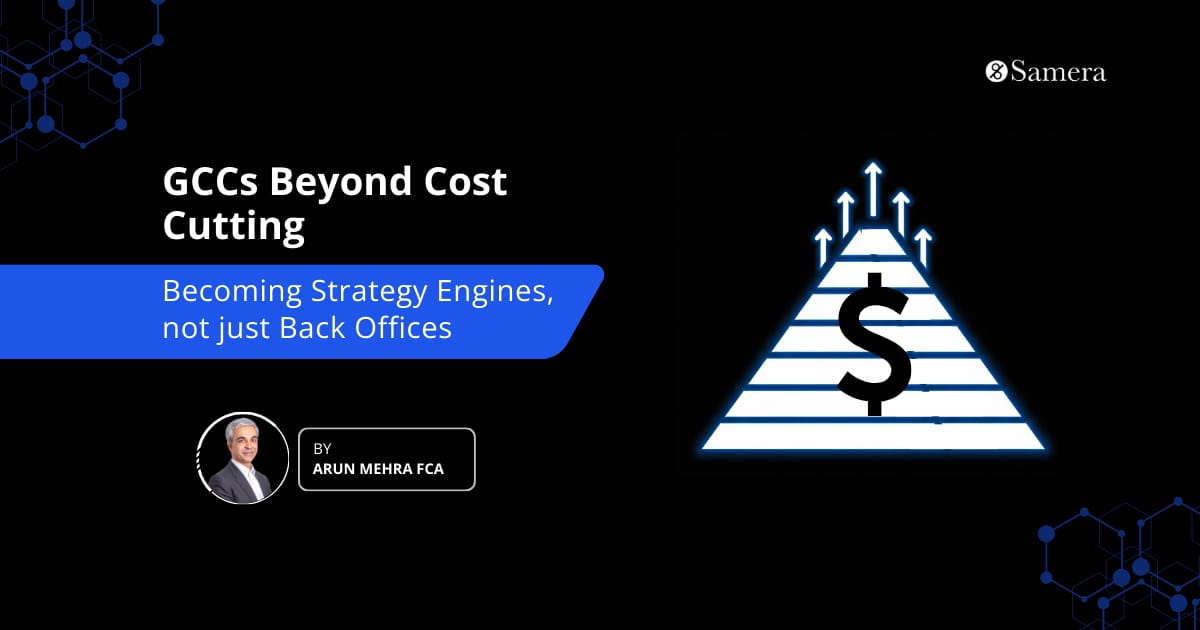Join "Going Global" our FREE Newsletter for Business Tips for Accountancy Firms.
Cost Cutting, is that All? GCCs Can Do More for Your Firm!
Why CFOs Should Expect More from Their GCCs

Hi everyone,
I’ve been speaking to a lot of business leaders lately, and I keep noticing the same mindset: “We set up a GCC in India to save costs. Job done.”
That mindset is not only outdated, but also wasteful.
The real story is that GCCs today are capable of much more than payroll processing or reconciliations.
In fact, the firms making the smartest use of GCCs are now turning them into centres of finance innovation, driving FP&A, treasury strategy, and even AI-led insights that are reshaping decision-making.
The question isn’t whether GCCs can save you money. It’s whether you’re ready to use them to transform your finance function.
From Transactional to Strategic Finance
Too many firms stop at “lift-and-shift” of routine finance work, AP, AR, reconciliations, payroll. That’s fine as a starting point, but it barely scratches the surface of what a GCC can do.
Look at what leading global players are already doing:
FP&A offshore: GCC-based teams are running scenario modelling, building rolling forecasts, and stress-testing budgets against market volatility. In some cases, they prepare the very decks that CFOs present at board meetings.
Treasury in India: Instead of keeping treasury exclusively at HQ, firms are relocating cash management, liquidity planning, and FX hedging to their GCCs. These teams use global banking relationships but operate at India cost levels.
The practical impact? Not just lower costs, but faster turnaround of forecasts, 24/7 coverage on treasury issues, and sharper insights feeding directly into global strategy.
If your GCC team isn’t providing inputs into your board-level discussions, say, by delivering monthly rolling forecasts or liquidity dashboards, you’re leaving a big opportunity untapped.
AI-Led Finance Insights Are Emerging from GCCs
AI in finance is not “future talk” anymore. It’s happening now—and GCCs are where a lot of the pilots are being run.
Some examples:
AI-powered anomaly detection: GCC teams are training models to flag unusual transactions in real time, reducing fraud and compliance risk.
Predictive cashflow analytics: By feeding historic data into AI models, GCCs are producing daily cash forecasts that are more accurate than traditional monthly reports.
Natural language reporting: Instead of static reports, CFOs are asking GCCs to use AI tools that generate conversational dashboards, where you can “ask” for variance analysis and get it on the spot.
Why GCCs?
Because they combine finance talent with local tech know-how. The cost of experimentation is lower, and the appetite for innovation is higher than in legacy-heavy HQs.
The key here is don’t wait for HQ’s IT roadmap to greenlight AI. Utilize your GCC by picking one finance process (like forecasting or variance analysis), run a pilot offshore, and then expand.
Governance and Trust Still Hold Firms Back
If there’s one big reason why GCCs are underutilized, it’s not skills, it’s trust. Many Western HQs still see their GCCs as “back offices” rather than strategic partners.
That mindset shows up in subtle ways:
HQs hold onto approval rights, forcing all strategic decisions back onshore.
GCC leadership is excluded from CFO town halls or global finance strategy meetings.
Reporting lines are designed to “report up” rather than “partner with.”
This creates a ceiling for GCC teams. Even when the talent is there, they don’t get to play at the right level.
And yet, some of the best examples in the market show that when firms build clear governance models (e.g., dedicated escalation paths, shared KPIs between HQ and GCC, and inclusion of GCC leaders in CFO dashboards), the results are transformational.
If you want your GCC to evolve, redesign your governance so it looks less like a “vendor management” setup and more like a leadership extension. Over time, align incentives across both teams.
Where Samera Fits In
This is exactly the kind of transformation we help firms unlock. At Samera Global, we help firms set up GCCs to elevate finance, going beyond proverbial cost cutting.
If your GCC is still seen as a back office, we can help you transform your offshore center as a driver of value, not just efficiency.
👉 See how we do it here:
Cheers,
Arun
How 433 Investors Unlocked 400X Return Potential
Institutional investors back startups to unlock outsized returns. Regular investors have to wait. But not anymore. Thanks to regulatory updates, some companies are doing things differently.
Take Revolut. In 2016, 433 regular people invested an average of $2,730. Today? They got a 400X buyout offer from the company, as Revolut’s valuation increased 89,900% in the same timeframe.
Founded by a former Zillow exec, Pacaso’s co-ownership tech reshapes the $1.3T vacation home market. They’ve earned $110M+ in gross profit to date, including 41% YoY growth in 2024 alone. They even reserved the Nasdaq ticker PCSO.
The same institutional investors behind Uber, Venmo, and eBay backed Pacaso. And you can join them. But not for long. Pacaso’s investment opportunity ends September 18.
Paid advertisement for Pacaso’s Regulation A offering. Read the offering circular at invest.pacaso.com. Reserving a ticker symbol is not a guarantee that the company will go public. Listing on the NASDAQ is subject to approvals.

